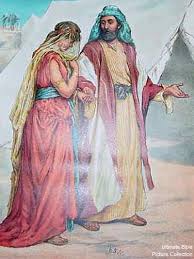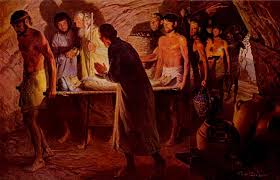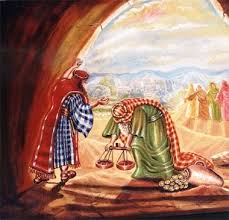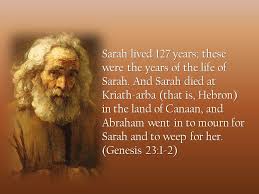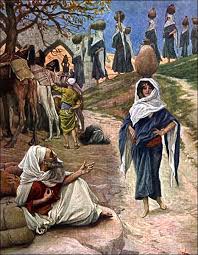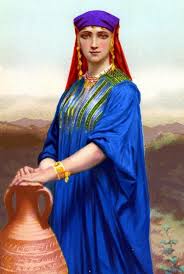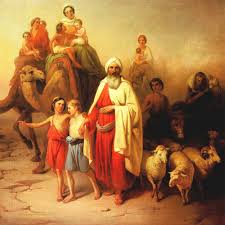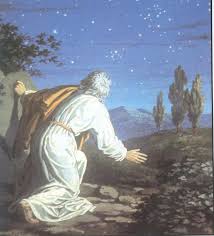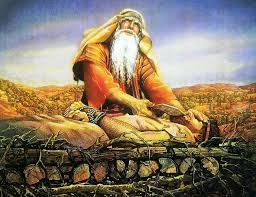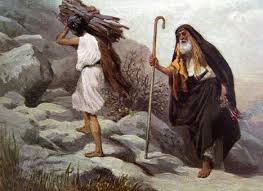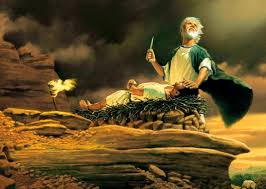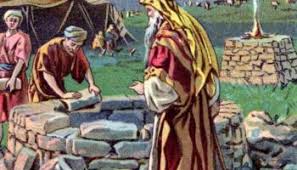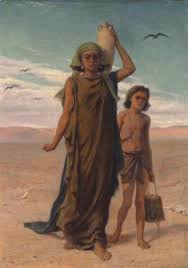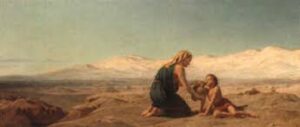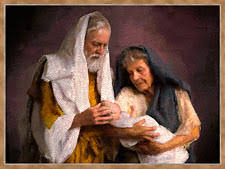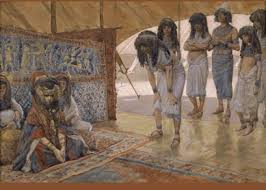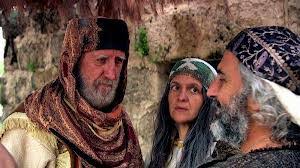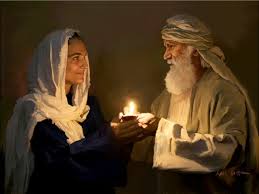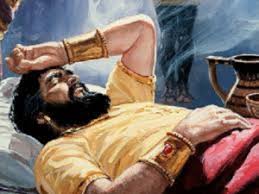Fx – Go to My Country and My Own Relatives and Get a Wife for My Son Isaac 24: 1-9
Go to My Country and My Own Relatives
and Get a Wife for My Son Isaac
24: 1-9
Go to my country and my own relatives and get a wife for my son Isaac DIG: What does Abraham communicate about God to his servant to whom he gives the responsibility of finding a wife for Isaac? What problems would be created if Isaac married a Canaanite? For ADONAI? For him? For you?
REFLECT: What can we learn about looking for a suitable spouse today? If you are looking to get married, how is this similar to the way the Lord wants us to find a mate today (see Second Corinthians 6:14-18)? Are there still “Canaanites” in the land where you live? Should you marry one of them?
Avraham was now old and well advanced in years, and ADONAI had blessed him in every way (24:1). Abraham was now one hundred and forty years old (25:20), and many of the individual promises of his covenant with God had been fulfilled in his lifetime. And as he approached the end of his life, his desire was to secure a suitable wife for his son. Isaac (Hebrew: Yitz’chak) was forty years old, and it was certainly time for him to be married. The parents normally chose the spouse for their children, but even at this age, Isaac completely trusted his father’s judgment in such an important decision.
He said to the chief servant in his household, the one in charge of all that he had (24:2a). The unnamed chief servant had a position of authority. He would have been the inheritor if Isaac had not been born. But he held no animosity and looked out for the welfare of his master. Avraham said: Put your hand under my thigh (24:2b). This is a euphemism for the holding of the genitals, which are the source of life. It is a solemn sign that if the oath were not carried out, the children who would be born to Abraham would avenge the servant’s unfaithfulness.382 This oath is also seen here and in 47:29.
The LORD Himself would be the witness to this oath. Abraham said: I want you to swear by ADONAI, the God of heaven and the God of earth. The chief servant must swear that he would not get a wife for Avraham’s son from the daughters of the Canaanites, among whom I am living. That is the key element in the oath. But he wanted him to go to Abraham’s country, to Avraham’s own brother Nahor, and get a wife for his son Isaac (24:3-4). Now, Abraham was not from a family with a godly line of history. In fact, they were idol worshipers (Joshua 24:2). So, in essence, there was very little difference between the Canaanites and the Babylonians (Abraham’s family background) in regard to their religious beliefs. If not, then what difference did it make whether she came from the Canaanites or Abraham’s idolatrous Babylonian family?
It seems that Abraham’s main concern was the moral degradation of the Canaanite society. True, Abraham’s family were idol worshipers, but apparently, their version of idolatry was different from the Canaanite practices. Laban, Isaac’s future brother-in-law, is a good example of this. He was cunning, (to see link click Hg – Jacob Marries Leah and Rachel), but not evil like the Canaanites who were notoriously sinful and practiced abominable customs in their form of idol worship. In other words, it was not the ideas and beliefs of the family of the girl who was destined to be the mother of the nation that were apt to endanger its future – but evil deeds.
What can we conclude from all of this? First, it is instructive to learn from Abraham’s example. He had no choice. He could not choose another believer for his son’s wife because there wasn’t any to be had. Therefore, he chose to do the next best thing. Instead of subjecting himself and his household to the sin and degradation of the society around him by choosing a wife for Isaac from them, he sought one from a people who, although they may not have been believers like he was, were nonetheless relatively free from the debauchery of the Canaanite society. It seems that the cultural or family background of the people our children intend to marry matters more than we think. The saying is true that we marry not just our spouse, but their family also. But Abraham gave Eliezer some very general criteria. She must be a virgin, one who loved her own family but who would be willing to make her home in the Promised Land. The Canaanites were cursed under the curse of Ham; so Avraham wanted a bride for his son from the line of Shem.
Second, Abraham was really a man of faith. He demonstrates it again and again, and here he is magnificent. He is basically saying to his chief servant, “You can count on God to lead you. He has promised me this.” Avraham is not taking a leap in the dark. Faith is not a leap in the dark! It must rest upon the Word of God. Many people say, “I believe in God, and it will come to pass.” That’s fine. It is wonderful for you to believe God, but do you have something in writing from Him? Abraham always asked for it in writing. ADONAI had made a contract with him. Avraham was really saying, “Elohim has promised me that through my seed Yitz’chak. He is going to bring a blessing to the world. You can be sure of one thing. The LORD has a bride back there for Isaac.” You see, Avraham rests upon what God has already said. We need not be foolish today. Faith is not foolishness. It is resting upon something. It is always reasonable. It is never a leap in the dark. Faith is not a gamble; it is a sure thing. And Abraham was sure.
My friend of the faith, if you have a young man or a young woman in your home that is of marriageable age, you ought to pray that he or she will not marry one of the Canaanites. They are still in the land, and there is always the danger of one of our young people marrying one of them. If they do, as someone has put it, they will have the devil for their father-in-law, and they are always going to have trouble with him.383
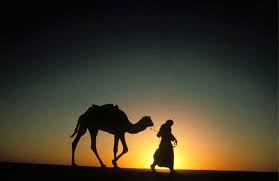
Abraham was too old to make the long trip back to Mesopotamia himself, for it was over four hundred and fifty miles. But he insisted that Isaac not go, because he knew that the heir of God’s promises should stay in the Promised Land. As a matter of fact, during his entire lifetime, Isaac never left Canaan at all (26:2-3). If Yitz’chak had gone in search of a bride, there might have been too great a temptation for him to stay with her among her own people, rather than returning to Canaan. She must be willing to come to him. Also, to reach Haran and Nahor from the Hebron-Beersheba region, Isaac would have to cross the land of Moriah, and he was forbidden to go back that way again (24:6 and 8). Therefore, Abraham sent his chief servant on the mission.384
Earlier in Chapter 22:1-8, we portrayed Isaac as a type of Christ. Here, in Chapter 24, that type is continued. Therefore, by type, Abraham, who is portrayed as God the Father, sends his chief servant, who is pictured as the Ruach, to a far away place to gather a bride, or the Church, for His Son, Yeshua Messiah. This chief servant is unnamed here, but back in 15:2 the one who would have inherited Abraham’s estate if he remained childless was Eliezer of Damascus. And Eliezer means God helps or God comforts. The reason the servant’s name is not mentioned here is that he was going in the name of Isaac and not his own name (John 16:13).
The servant raised a logical question: What if the woman is unwilling to come back with me to this land? Shall I then take your son back to Aram, the country you came from (24:5)? Isaac, the son of promise, must not be removed from Canaan, the Land of Promise! In type, the bride of Messiah is to be brought to the bridegroom’s home in heaven (Matthew 25:1-13). To emphasize this point Abraham says: Make sure that you do not take my son back there (24:6). What happens when the Son comes back again? He comes back as the Lion of the Tribe of Judah (Revelation 5:5), because he brings the day of vengeance (Isaiah 61:2b), the hour of His judgment (Revelation 14:7), and the wrath of God (Revelation 16:1). And He comes with His Church, the Bride, who follows Him riding on white horses and dressed in fine linen, white and clean (Revelation 19:14). No, the bride must be gathered before Messiah returns.
Abraham had faith that the LORD would provide divine guidance to find such a wife for Isaac. He said: ADONAI, the God of heaven, who brought me out of my father’s household and my native land and who spoke to me and promised me on oath, saying, “To your offspring I will give you this land” – He will send His angel before you so that you can get a wife for my son from there (24:7). When compound names of God are used they emphasize His relationship to man or the nation of Isra’el in particular. Here His relationship to Isra’el is emphasized. But to relieve the chief servant’s anxiety, Abraham provides one exception. If the woman is unwilling to come back with you, then you will be released from this oath of mine. For the reasons mentioned above, Abraham emphasizes a second time: Do not take my son back to Aram (24:8). In his lifetime, Isaac would never leave the Promised Land, and neither would Yeshua Messiah.
So the servant put his hand under the thigh of his master Abraham and swore an oath to him concerning this matter (24:9). Thus, a solemn oath precedes the mission. Now watch the chief servant as he goes out to get a bride for Isaac.



